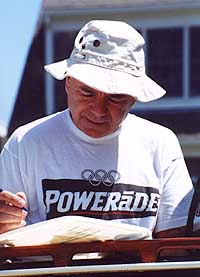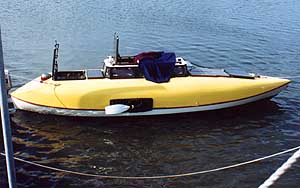|
. |
||||
|
|
||||
|
|
16th
May 2001
|
|||
| CHATHAM
--- Shortly after 1:30 p.m. Friday, a 62-year-old retired cardiologist
from Chicago rowed his 20-foot heavy weather rowboat away from Chatham,
bound for Europe. If he makes it, Nenad Belic will be just the fourth successful
ocean row to have departed from Cape Cod. The first in 1966 were Brits.
John Ridgway and Chay Blyth rowing together in English Rose 3 then in 1980
Frenchman Gerard d Aboville rowed solo followed in 1995 by Frenchman
Joseph Le Guen also solo.
As of early Tuesday, the Yugoslavian-born Belic was reported to be about 100 miles east of Cape Cod, where he would be encountering gale force winds and tall seas from an unexpected offshore storm. |
||||
|
||||
| But
by Tuesday, a weak storm system that moved through New England over the
weekend had begun to move back to the west from the Canadian Maritimes,
according to National Weather Service Meteorologist Tom Fair at the Taunton
forecast office.
"It's an abnormal weather system,"
Fair said. "Usually they go from west to east, and this one is going from
east to west." As of noontime Tuesday, Fair said conditions 100 miles east
of the Cape were unfavorable, with northeast winds around 30 knots and
10- to 12-foot waves.
|
||||
|
||||
| After
contacting Belic's family, the Coast Guard in Woods Hole passed on the
information to its district operations center in Boston, which, in turn,
is sending it to the Atlantic Area Command in Portsmouth, Va. Kondratowicz
said officials have yet to have any direct contact with Belic, who did
not return the Coast Guard's e-mail message.
"But there's probably reasons for that," Kondratowicz said. "I'm not apprehensive. Think the guy took all the preliminary steps and made sure he had all the necessary safety equipment. Of course, it would've been nice to have physically inspected his boat prior to departure," he added. The Lun had its sea trials on Lake Michigan, during two 300-mile practice trips from Chicago to Mackinac Island, Belic said. During the runs, Belic encountered seven-to-eight-foot waves and stiff winds. Belic said he thought the trial was an adequate test of conditions on the North Atlantic. A father of four, said he has come to terms with the danger inherent in the passage. "My wife, she is a darling," Belic said. "But she is not doing very well with this." Belic estimates that there is a 50 percent chance that he will successfully reach Europe, and a 48 percent chance that he will have to turn back. "The risk of disappearing is about two percent," he said. Since 1966, six ocean rowers have have been lost at sea 5 of them attempting to row across the Atlantic and 1 while trying to row the Pacific. "Life is hazardous," Belic said, not gazing up from the weather reports in his hand. Among those closely watching Belic's progress is Kenneth Crutchlow of the London-based Ocean Rowing Society. Crutchlow said that another mariner, Frenchman Emmanuel Coindre, is currently attempting a passage traveling the other way, from Canary Islands to the West Indies and Tim Welford and Dom Mee are rowing the Pacific from Japan headed for San Francisco. The safeness of an ocean rowing trip does not necessarily hinge on the size of the boat, Crutchlow said. "It has more to do with the self-righting capability of the boat, rather than the size," he said. One key (besides being properly equipped) to a successful passage is to leave early enough in the season to avoid the bad weather off Europe in the autumn, Crutchlow said. "A rower does not want to be at sea in September, certainly not in October, and no way in November," he said. "So let's hope he has a fast crossing." The record for the fastest passage leaving from Cape Cod is held by Gerard d'Aboville of France, who rowed his boat, Captaine Cook, from Chatham to Lizard Meridian in 71 days, 23 hours. , While there is no substitute for practice on the open ocean, Crutchlow said, Belic already has more experience than many first-time rowers who have never taken their boats to sea before attempting the passage. Even under ideal conditions, it is not likely that Belic will make landfall in Portugal, Crutchlow said. Of the 9 successful west-to-east transatlantic passages on record, five made landfall in Ireland. 1 in UK and 2 in France. "No matter what, it will be winds and currents that dictate where he goes," Crutchlow added. In his only newspaper interview before embarking on the trip, Belic said he knew he would be asked the obvious question: why is he attempting the trip? "It is a question to which there is no answer," he said. |
||||

